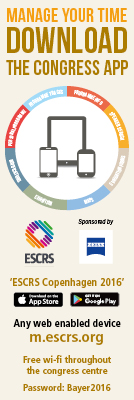Posters
Tearfilm biomarkers: novel non-invasive predictors to prognosticate outcomes of cystoid macular edema following uncomplicated cataract surgery
Poster Details
First Author: A. Braganza INDIA
Co Author(s): P. Subbaiah S. Braganza A. Ghosh
Abstract Details
Purpose:
To report a case of acute bilateral simultaneous cystoid macular edema (CME) or Irvine-Gass syndrome following uncomplicated cataract surgery in a patient with no predisposing factors monitored by serial OCT and tearfilm biomarker analysis by cytometry bead array (CBA).
Setting:
A TERTIARY MULTISPECIALITY EYE CARE HOSPITAL
Methods:
A 60 year old male without any significant systemic history underwent uncomplicated phacoemulsification with intraocular lens implantation in both eyes. He presented with acute bilateral simultaneous cystoid macular edema (CME) postoperatively on day 66 with best corrected visual acuity (BCVA) of 6/60,N36. Diagnosis was made clinically and confirmed using serial OCT. Central macular thickness (CMT) was 542 and 626 microns in right and left eye on presentation.Twenty tearfilm inflammatory biomarkers were also analysed by CBA on serial visits to monitor the progression of CME and treatment. Topical NSAIDS and carbonic anhydrase inhibitors were given for twelve weeks.
Results:
In our patient who presented with acute simultaneous bilateral CME following uncomplicated cataract surgery, BCVA improved to 6/6,N6, CMT reduced to 322 and 319 microns in right and left eye, tearfilm biomarkers like IL1β, IL8,IL10,MCP1,VEGF which were elevated at presentation showed a decrease in the same after treatment with topical NSAIDS and carbonic anhydrase inhibitors for twelve weeks.
Conclusions:
Tearfilm biomarkers can be used as novel non-invasive predictors to prognosticate the outcomes of cystoid macular edema following uncomplicated cataract surgery in a patient with no predisposing factors.
Financial Disclosure:
NONE





